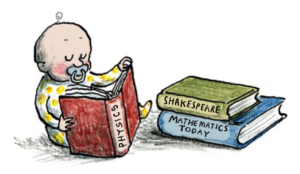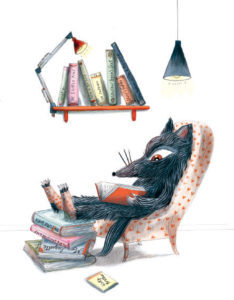An Extract from the 2021 storylines margaret Mahy lecture by julia marshall
On the Gecko Press website it says it only takes one good book to spark a lifetime of reading. I don’t think it matters what the book is; if the book is right for a reader at that moment, then it is a good book.
Each of us, I imagine, has many books we could choose as the one that started us reading.

And it is never just one book; it is much more likely to be a person. Or ten people, each being the right person with the right book, at different moments.
For me, publishing has always been about people, and reading is too. It is people that inspire children to be readers, lifetime or otherwise.
My people were my family.
I had the great fortune to grow up in a family of readers—my mother says if she was to bring us up again we probably wouldn’t be allowed to read at the table. Dad hardly moved from his chair on holiday. None of us did. (My mother says people who don’t read get a lot more done).
I was also lucky to have a mother who took me to the library and the bookshop. I remember the exact place I was in Hayman’s PaperPlus, in Marton, when my mother suggested I might like to try something other than the next book in the Jill and the Pony series, nudging me firmly in the direction of National Velvet and Noel Streatfield.
 I had an uncle who could make puffball soup and Turkish Delight, who spoke Spanish and read Winnie the Pooh in Latin, and lectured on William Blake at Auckland University, who sent me parcels with the Green Book of Fairies and Don Quixote. I didn’t much care for them, but I can see them in my mind, even where they lived on the shelf. And I felt singled out, and special.
I had an uncle who could make puffball soup and Turkish Delight, who spoke Spanish and read Winnie the Pooh in Latin, and lectured on William Blake at Auckland University, who sent me parcels with the Green Book of Fairies and Don Quixote. I didn’t much care for them, but I can see them in my mind, even where they lived on the shelf. And I felt singled out, and special.
There was a man who visited our house and asked me what I was reading, and when I said I had put my book down because I didn’t like that things weren’t going well in it, he told me that I must keep going, because that was the point, knowing how to read through tough moments. You have to have those moments, he said. “Keep reading.”
There was a teacher who told me I could be a writer when I was seven and I spent the next 20 years believing that. There was another teacher who sing-songed us poems in class along with her daughter who was an actor. Another teacher let us choose any writer we liked for our projects, and I chose Roger McGough.
My grandmother read the books she gave me for Christmas first, something I now do often myself, and one year she said she hadn’t much liked the book but was interested to see what I thought. She also gave me the biography of the open marriage between Vita Sackville West and Harold Nicolson, which let some fresh air into my early teenage reading.

My point is not only that I was lucky, but how important these people all are, creating a reader.
For every reader there is this group of people, this village, that nudge the children to find a good book at just the right moment. The act of nudging a child to read is really the act of noticing. It is not enough to hand out books in an assembly and expect that to change the lives of those receiving them.
Because nudging is not a single act; we need armies of people who understand this and support the teachers and the librarians who are constantly making the link, that reading is a way out and a way in. Once the connection has been made, for it to stay alive, there need to be more books, more nudges from more people, and they need to be meaningful to what that particular child needs at that particular moment.

Reading is really up against it right now—our libraries are at risk, our school libraries are disappearing, and people spend more and more time on our phones. Of course we do. It is our job to advocate on behalf of children having access to reading and on raising the value of reading, on maintaining our reading village. Because it takes a village to spark a lifetime of reading.
This is just an extract from Julia’s lecture at the 2021 Storylines Awards ceremony. You can read the full lecture on the Storylines website.
Want to hear more from Gecko Press? Every month we send out a newsletter with all of our latest blog articles, activity sheets, and sometimes a competition too! Sign up to our mailing list here.

